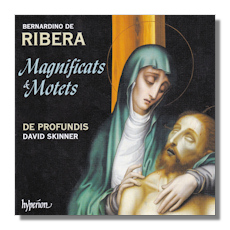
The Internet's Premier Classical Music Source
Related Links
-
Ribera Reviews
- Latest Reviews
- More Reviews
-
By Composer
-
Collections
DVD & Blu-ray
Books
Concert Reviews
Articles/Interviews
Software
Audio
Search Amazon
Recommended Links
Site News
 CD Review
CD Review
Bernardino de Ribera

Magnificats and Motets
- Rex Autem David
- Gloriosae Virginis Mariae
- Beata Mater
- Dimitte Me Ergo
- Magnificat Primus Tonus I
- Vox In Rama
- Regina Caeli
- Magnificat Secundus Tonus I
- Virgo Prudentissima
- Conserva Me, Domine
- Assumpsit Jesus Petrum
- Magnificat Quartus Tonus II
- Hodie Completi Sunt Dies Pentecostes
- Anonymous, C16th:
- Non Vos Relinquam Orphanos
- O Rex Gloriae
- In Ferventis
De Profundis/David Skinner
Hyperion CDA68141 76:51
Bernardino de Ribera is closely associated with the beautiful cathedral of Toledo. He was born around 1520 and died either in late 1571 or early 1572 as has been thought until recently; or as late as 1580 after having served as maestro de capilla in Toledo from 1563 to 1570, thence moving to Murcia. A pupil of his father, Pedro Ribera, Bernardino in turn taught Victoria – and was an obvious influence on the latter with long, gentle choral lines – where single vocal ideas communicate as much as does the exchange of harmonies between voices which gradually gained stylistic ground in the next century. Ribera's music may remind you, too, of Morales' and Guerrero's; ultimately it derives its flavor from the Low Countries, and from Gombert in particular.
The music on this CD has the remarkable characteristic of being the result of a salvage operation to restore Ribera's music from a Codex known as the E-Tc6 in the Cathedral at Toledo. It was finished in 1570 in the final years of the composer's tenure there. The volume was heavily vandalized in the eighteenth century, when whole folios were sliced and carved out. Where the beautiful illuminated first letters were excised, not only were the (nearby) incipits lost; but also the text and music in the corresponding parts of the reverse of the page. Entire masses by Ribera are irretrievably lost; but the motets fare better. It could easily be argued that, were there more surviving works by Ribera, he would have taken his place in the pantheon which does indeed contain Morales, Guerrero and Victoria.
This excellent CD on Hyperion from De Profundis shows little sign of such a disappointment. It allows us to judge just what we are missing when we have the opportunity to get as much as this from some of Ribera's remaining output. We come away from listening to these dozen or so wonderful motets and maginifcats with lacunae intelligently filled by Skinner (using justified interpolation or plainchant) wishing that more were known and available by Ribera so compelling and contained is his choral world. Not only does there appear to be next to nothing by the composer in the current recorded catalog, but David Skinner (De Profundis' conductor) confirms that all the works here except Beata Mater [tr.3] are first recordings.
De Profundis was founded by Mark Dourish in 2011. Its members are "hand-picked" amateur and semi-professional singers in Cambridge, London and the South East of England who sing exclusively Renaissance sacred music from the European mainland. In keeping with what is known about the composition of choirs in Renaissance churches and chapels, sets of all-male singers are chosen for De Profundis as the concert or recording demands. Although pitch varied across Europe, the ensemble generally uses lower pitch where the top lines were sung by falsettists, boys or both; and the "alto" by high tenors.
Such an approach indeed produces a compelling account on this over 75 minutes of music. It's controlled, almost subdued without sounding "dreamy" or losing any of its impetus. At the same time, the alternation of movements does more than hint at Ribera's accomplishment. It is knitted together with a real sense of musical and textual cohesion by these singers, who have warmed to Ribera's world and made it their own.
The acoustic of St George's church, Chesterton, near Cambridge, offers just the right amount of reverberation; but the recording never substitutes spurious atmospherics for intelligent music-making. De Profundis easily makes this otherwise overlooked choral singing sound, if not familiar, rich, penetrating and accessible. Even the most substantial works, such as the sublime Magnificat Primus Tonus I [tr.6] presents both a highly successful blend of authority with a light touch of command on the one hand; and, on the other, how well the composer draws the listener in as the over nine minute-long work doesn't so much "unfold", as suggest its treasures. But the pace, sensitivity to the interplay of lines and textures leaves the careful listener in no doubt about whether or not they will take up the invitation to explore them.
Another gem which exposed Ribera's gifts is the Conserva Me, Domine [tr.14], whose sinuous yet directed melodic lines are nothing short of enchanting, beguiling, enveloping. It too is one of the lengthier works at six and a half minutes (only the Magnificats are longer). Like them, it shows just how able Ribera was to develop a thematically-"argued" work which supports the text in ways every bit as striking as those of his better known contemporaries. This acceptance of Ribera's strengths is – rightly – the approach taken by the two dozen members of De Profundis as the CD progresses.
This CD is valuable both for the specifics of the rescue of the wonderful sixteenth-century Spanish music; and also for the delight which the controlled yet penetrating performances by De Profundis offers. Lacking other advocates, Bernardino de Ribera is in good hands here. If this is repertoire you love, you'll not be disappointed by the originality and heights reached by Ribera. If you know of his work but have no examples, then this is a release you will not want to miss.
Copyright © 2016, Mark Sealey


















